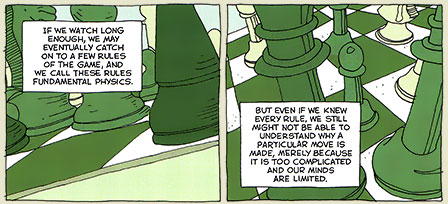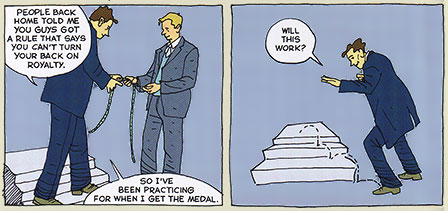Feynman
Created by: Jim Ottaviani and Leland Myrick
Published by: PUBLISHER
ISBN: 1596432594 Amazon
Pages: PAGES



Somewhere around two years ago, I ran into a video clip in which a brilliant physicist almost-patiently explained to an interviewer why he would not be explaining how magnets work to the man. Indeed, why he couldn't explain the phenomenon or any of the laws that govern it. The physicist was Richard Feynman and his answer was essentially that the question would demand an infinitely regressing series of Why questions, each one more complex and specialized than the last. Or in short, the interviewer wasn't smart enough to understand the answer.*
I was amused by Feynman's response to the question and the manner of his delivery. I had always intended to seek out the documentary or series from which the clip was excerpted, but for one reason or another never found the time. Still, his name lingered in my cognizant mind and when I saw that a comic about the man was being produced, I happily sought it out.
Through a happy coincidence, not two weeks before Feynman arrived on my desk, I had the opportunity to read Logicomix, the record of another luminous mind of the 20th century. Where Feynman lays out the life and intellectual pursuits of a great theoretical physicist, Logicomix follows the rigourous quest of Bertrand Russell, one of the era's great logicians. And despite their not-so-interrelated fields of expertise, the two books enjoy quite a bit of overlap, both in terms of characters** and themes.

One of the abiding motifs that Feynman's character in Feynman hopes to impress upon the reader is the infinite complexity of things, of physical things. Scientists have names and formulae to describe any number of processes that govern our world, but do they truly understand these things or are they just ridiculously dedicated to the art of taxonomy? Feynman, in a number of ways, cynically suggests the latter. After all, there's only so much headway the finite can make when rushing toward the infinite. The question of how to sound out our depths when we are out of our depth is the central conflict in Russell's story and is the bugbear that nearly drives him to ruin and madness.

Feynman, being a clown, never seems too close to madness. He is always knee-deep in wonder at the gala production the universe displays for him in every moment to be concerned with sanities. He is, however, also well-aware of the genius scientist's humble position before the natural world—how the physicist must grovel before the unknown just to get a little further down that chain of ever-more-specified questions.
Feynman is a lot more funny than I expected it to be. This is the story, among other things, of the development of The Bomb. Of "I am become death" and all that. The story of the 20th-gory-century. Both Feynman and Logicomix sit amidst the tumult of Hitler's Germany and horrible things that well-eclipse the dreams and goals of individual men. And yet while Feynman could have been a somber reflection on the works of men, because it contains the character of Richard Feynman as its central spirit and guiding light, it really cannot be anything other than amusingly interesting.
 That's right Richard. You made The Bomb and all you can do is bang on your drum? Get real, man.
That's right Richard. You made The Bomb and all you can do is bang on your drum? Get real, man.
Even in the darkness of the human struggle, jest overpowers meditation. Feynman has thoughtful things to communicate, careful ideas to draw out—but it does so with winks and smirks. With an eye to the adventure that life can be if only one can see the adventure that life is.
Feynman is a wonderful book, well-written (with the now-deceased physicist as our interlocutor) and presented with a relaxed art-style that communicates the easy-going spirit of the man effortlessly. The book also delivers what I had wished Logicomix would have: a concise, detailed explanation of its hero's central Remarkable Idea. Feynman won a Nobel Prize for his work describing and solving quantum electrodynamic principle (QED). If magnets are not the kind of thing that can be explained to laymen, QED is the kind of thing that probably shouldn't even be named. Still, I was hungry to get a taste (and therefore appreciation) for just what Feynman did that was so incredible. Feynman delivers by recreating, in the book's final pages, a lecture on QED that Feynman delivered in New Zealand to an introductory-level physics class. It's tough to follow, complex, and probably a bit above most of our heads, but I was glad that it was there. And the book is probably better off for its inclusion.

Both Logicomix and Feynman successfully translate their giant figures into human characters with whom readers can empathize. Both books function well as distillations of lives readers might not otherwise appreciate. Both books crack open doors into understanding the story of the 20th century from directions usually unmapped and unexplored. Both books are truly wonderful and very much worth the reader's time.
Only one of them, however, will make one laugh.***
 Oh Richard, you card.
Oh Richard, you card.
Notes
*To be fair, Feynman probably wouldn't have described himself as being smart enough to understand The Answer either.
**Or at least one character. John Von Neumann, the great mathematician and one of the giants in the early days of computer sciences makes appearances both in Feynman's and Russell's lives at various points in the two narratives.
***And I'm not telling which.
Good Ok Bad features reviews of comics, graphic novels, manga, et cetera using a rare and auspicious three-star rating system. Point systems are notoriously fiddly, so here it's been pared down to three simple possibilities:
3 Stars = Good
2 Stars = Ok
1 Star = Bad
I am Seth T. Hahne and these are my reviews.
Browse Reviews By
Other Features
- Best Books of the Year:
- Top 50 of 2024
- Top 50 of 2023
- Top 100 of 2020-22
- Top 75 of 2019
- Top 50 of 2018
- Top 75 of 2017
- Top 75 of 2016
- Top 75 of 2015
- Top 75 of 2014
- Top 35 of 2013
- Top 25 of 2012
- Top 10 of 2011
- Popular Sections:
- All-Time Top 500
- All the Boardgames I've Played
- All the Anime Series I've Seen
- All the Animated Films I've Seen
- Top 75 by Female Creators
- Kids Recommendations
- What I Read: A Reading Log
- Other Features:
- Bookclub Study Guides









